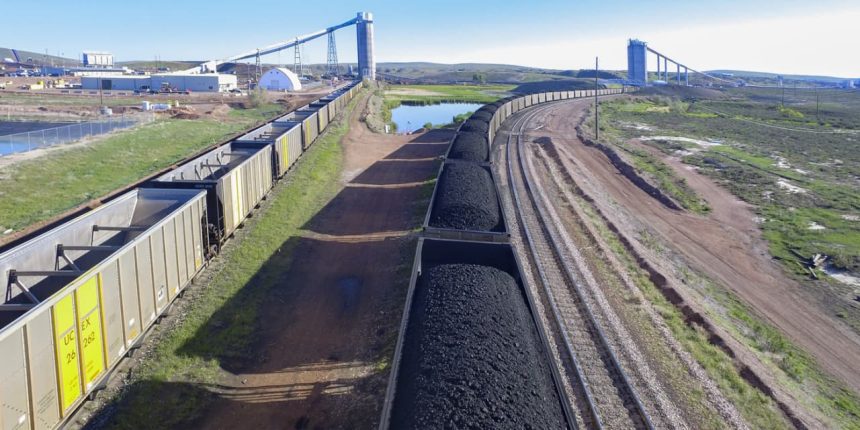While most stocks crashed and burned last month, shares of coal miners were red hot.
Shares of
Alpha Metallurgical Resources
(ticker: AMR),
Warrior Met Coal
(HCC), and
Arch Resources
(ARCH), producers of metallurgical coal, which is primarily used for steel production, soared 28%, 29%, and 31%, respectively, in September.
Consol Energy
(CEIX) and
Peabody Energy
(BTU), producers of both met coal and thermal coal, used for electrical generation, saw shares gain 22% and 20% the same month.
Most stocks didn’t fare nearly as well. The
S&P 500 index
dropped 4.9% in September, while the
Nasdaq Composite
fell 5.8%.
There’s no coal exchange-traded fund to compare with the indexes because the only coal ETF shut down at the end of 2020 after only 12 years in operation. VanEck, which administered the VanEck Vectors Coal ETF, said at the time that it “continuously monitors and evaluates its ETF offerings across a number of factors, including performance, liquidity, assets under management and investor interest, among others. The decision was made to liquidate the fund based on an analysis of these factors.”
Investors couldn’t fault VanEck. Institutional pledges in the name of environmental, social, and governance goals to cut investments in companies that produced carbon emissions have worn down the sector. The Trump administration had pledged to revive coal as an energy source, but it couldn’t fight falling demand and cheaper alternatives in the form of natural gas and renewables. More than a dozen U.S. coal companies filed bankruptcy during Trump’s presidency. With the Democratic Biden administration coming in, the sector looked ready to be swept out with the ashes.
Then coal’s fortunes unexpectedly improved as Russia invaded Ukraine in February 2021. In the words of Warrior Met Coal CEO Walter J. Scheller, “the war in Ukraine created a backdrop for further global supply constraints and price volatility, with urgent demand for non-Russian met coal.”
Four of the five coal stocks tripled or quadrupled in 2021, including Alpha Metallurgical, which rebranded as such in February 2021 from Contura Energy after transforming itself to focus on met coal. Still, Alpha stock rocketed more than 350% from that February to the end of 2021. The laggard that year was Warrior Met Coal, which gained 21%, comparable with the S&P 500’s 27% rise, and 21% gain in the Nasdaq.
The next year was a doozy for stocks in general, but three of the coal stocks nearly tripled, while Warrior Met Coal and Arch Coal shares logged respective 2022 gains of 35% and 56%. That year saw 19% wiped away from the S&P 500, while the Nasdaq dove 33%.
This year hadn’t been shaping up for dynamite returns. In fact, by the fourth quarter of 2022, the Organization for Economic Cooperation and Development said the “outlook for global steel markets has deteriorated sharply”—not good for met coal. The OECD cited the global economic slowdown, high energy prices and accelerating inflation, Russia’s war against Ukraine, supply-chain disruptions, and a sharp downturn in China due to problems in real estate sector and Covid-19 lockdown policies. Thermal coal prices were sliding, as well, pressured by an unusually warm winter, which cut demand for electricity for heating, plus increased competition from renewables such as wind and solar energy.
The prices of exported met and thermal coal have both come down from 2022 highs, but they remain elevated over the last several years, according to the U.S. Energy Information Administration. Shares of the five coal companies aren’t on track for the outsize gains of 2021 and 2022. Even with September’s surge, shares of Alpha Metallurgical, Warrior Met Coal, Arch, and Consol sported respective gains of 77% 47%, 20%, and 61% for the first three quarters of 2023. Peabody stock was down 1.6%.
Madrid-based azValor Asset Management had owned Consol stock a few years ago but exited the investment “a notch under $85″ after a run-up from $3.50 to $3.60, according to an email from Álvaro Guzmán de Lázaro, founding partner, CEO, and co-chief investment officer. He added, “We do own Arch and we’re one of the biggest holders there.” An August filing with the Securities and Exchange Commission shows azValor owns more than 900,000 Arch shares, a stake of just over 5%.
“Arch is the lowest-cost producer in the U.S., which is something we focus on as we always look for high-quality assets,” Guzmán de Lázaro noted, adding, “But most importantly the market is still not pricing the shares right in our opinion.”
Even if coal prices don’t retrace their highs, investors are somewhat protected by aggressive stock repurchases at four of the five companies. Fewer shares outstanding makes each share held by investors more valuable. Alpha Natural has bought back 30% of its shares outstanding under a buyback plan, paying $850 million through July since the plan’s inception; it has another $350 million remaining under the plan.
Consol said in early August that so far in 2023 it has bought back 3.1 million shares, more than 9% of its public float, which is the number of shares owned by public investors and available to trade. Peabody bought back 12 million shares, or 8.3% of shares outstanding, so far this year through July 19, and has “at least” $142 million available for additional share repurchases. Arch paid $73.5 million in the second quarter to buy back 623,304 shares, and had $248.9 million of remaining authorization under an existing $500 million share-repurchase program.
The S&P 500 index sports a gain of 12% for the first three quarters of the year, with no help from coal names. While the index requires a minimum market capitalization of $14.6 billion for inclusion, the five coal companies’ market caps range from mid-$2 billion to mid-$3 billion.
Write to Ed Lin at [email protected]
Read the full article here




